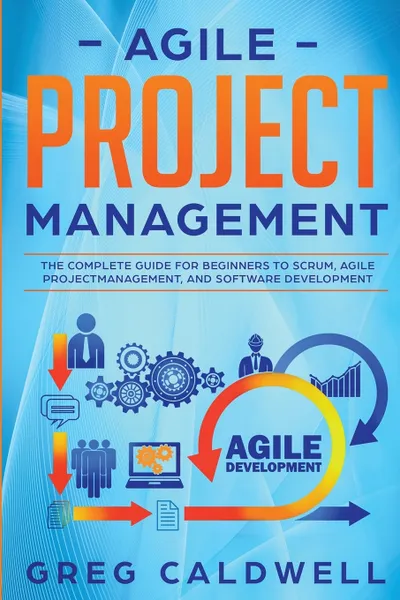Agile Project Management. The Complete Guide for Beginners to Scrum, Agile Project Management, and Software Development (Lean Guides with Scrum, Sprint, Kanban, DSDM, XP & Crystal)
Автор: Greg Caldwell
2020
Переплёт: Мягкая обложка, 172 страницы
Категория: Научная литература
ISBN: 9781951754334
📓 Have you ever tried your hand at software development only to find out that it's much harder than you prepared for? Not only do you have to make sure that your skills are up to par with everybody else but there is also the matter of coordinating with everyone involved in that project.
And with Collaboration comes the potential for complexity. Soon enough, you'll be juggling different deadlines and correspondences, deal with differences in design approaches, and wade through deep technical problems. Aside from that, you'd have to deal with pressure from investors and stakeholders whose visions your team is trying to translate into something tangible but often get blindsided by last-minute committee decisions.
Now, what if you are open to a more agile method of managing projects but find changes in your results to be insignificant? For instance, you might have adopted methodologies like Scrum and XP but find your team of going through the motions of the change instead of fully embracing such.
Managing a project that requires collaborative effort is complicated and often challenging, there is no doubt to that. But what if someone were to tell you that you can help your team achieve its goals at a faster and far more effective pace? This is where this book comes into play.
In this book, you will learn the different Agile Methodologies, the rationale behind their structures, and the values, principles, and concepts that you could use in employing them.
If that is not enough for you, here are a few more things that the book will focus on:What motivates teams and what ideas and principles do they identify with the most?The basics of the four major Agile methodologies: Scrum, XP, Kanban, and Lean. What makes them different from one another?Restructuring your team's framework to be more compatible with agile methodologies.Picking the right methodology for your team or for a certain project.Preparing, dealing with, and mitigating potential problems that might arise from the application of methodologies.Ensuring sustainability in the application of agile methodologies.In essence, by learning of the Why behind Agile Project Management methods, you can find the How in implementing them for your own team. And eventually, you should be able to achieve the results you have set for the team or, better yet, go beyond those.
The information provided in this book has been organized in such a way that it is easy to understand and master, even for those who are relatively new to the concepts of software development and project management.
If the prospect of learning how to finish projects faster and more effectively intrigues you, then it is now time to dive deep into the world of Agile Project Management!
And with Collaboration comes the potential for complexity. Soon enough, you'll be juggling different deadlines and correspondences, deal with differences in design approaches, and wade through deep technical problems. Aside from that, you'd have to deal with pressure from investors and stakeholders whose visions your team is trying to translate into something tangible but often get blindsided by last-minute committee decisions.
Now, what if you are open to a more agile method of managing projects but find changes in your results to be insignificant? For instance, you might have adopted methodologies like Scrum and XP but find your team of going through the motions of the change instead of fully embracing such.
Managing a project that requires collaborative effort is complicated and often challenging, there is no doubt to that. But what if someone were to tell you that you can help your team achieve its goals at a faster and far more effective pace? This is where this book comes into play.
In this book, you will learn the different Agile Methodologies, the rationale behind their structures, and the values, principles, and concepts that you could use in employing them.
If that is not enough for you, here are a few more things that the book will focus on:What motivates teams and what ideas and principles do they identify with the most?The basics of the four major Agile methodologies: Scrum, XP, Kanban, and Lean. What makes them different from one another?Restructuring your team's framework to be more compatible with agile methodologies.Picking the right methodology for your team or for a certain project.Preparing, dealing with, and mitigating potential problems that might arise from the application of methodologies.Ensuring sustainability in the application of agile methodologies.In essence, by learning of the Why behind Agile Project Management methods, you can find the How in implementing them for your own team. And eventually, you should be able to achieve the results you have set for the team or, better yet, go beyond those.
The information provided in this book has been organized in such a way that it is easy to understand and master, even for those who are relatively new to the concepts of software development and project management.
If the prospect of learning how to finish projects faster and more effectively intrigues you, then it is now time to dive deep into the world of Agile Project Management!
Мнения
